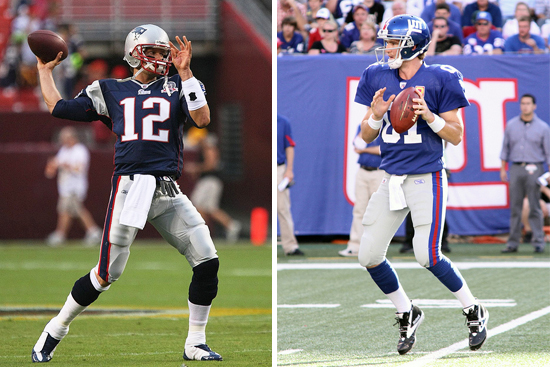Super Bowl Mentality
BU sports psychologist: what Pats need to win

Looking for revenge: New England Patriots quarterback Tom Brady (left) will face off against New York Giants quarterback Eli Manning in Super Bowl XLVI on Sunday. Photos by Keith Allison and Flickr user Mike L.
Super Bowl fever has hit Boston, and Sunday night’s game is one of the most eagerly anticipated in years. The showdown between the New England Patriots and the New York Giants pits two equally talented longtime rivals, one with a burning desire to avenge 2008’s heartbreaking loss (in case you’re from Mars—Giants 17, Pats 14). The game is the Patriots’ 7th Super Bowl, their 5th in the last 10 years; they’ve won 3.
This year’s rematch of Super Bowl XLII, when the Giants’ upset of the season-undefeated Pats made them the first NFC wild card team ever to win a Super Bowl, has drawn particularly intense interest. So Super Bowl XLVI is must-see TV for the 100 million fans expected to tune in.
To boot, the game is being played in Indianapolis, home turf of Giants quarterback Eli Manning’s brother, Peyton, of the Colts. Sports pundits have also made much of the fact that both of this year’s teams lucked out during their conference championships, with games decided by a field goal kick.
As any sports commentator, coach, or player will tell you, the NFL championship is about more than athletic ability—it’s a mental game, too. And with so much pressure on the teams heading into Super Bowl weekend, we decided to talk with Adam Naylor, a School of Education clinical assistant professor of sports psychology and director of BU’s Athletic Enhancement Center, about how the Patriots should prepare. Naylor (SED’97,’01) has more than a decade of experience educating and coaching Olympians, major and minor league professionals, and collegiate athletes.

BU Today: The Pats lost to the Giants by just three points in 2008. How should they approach this year’s Super Bowl?
Naylor: That’s a great question. Trite as it sounds, they should approach this relatively like it’s any other game. That’s easy to say, because obviously there will be more emotions than in other games. I think that they should appreciate and expect the other emotions, but go through the same structure of: here are my goals for today, here’s how I prepare, and try to remain relatively consistent with the actions of game-day prep, even though the emotions will be a little higher. It’s those actions that will pull down the emotions to a reasonable level.
When I sit down with my athletes, I say, it’s certainly not going to feel like just another game, but let’s not get too dramatic on either side. We want to find the middle a little bit. If they don’t soak in a little of the excitement of it, they shouldn’t play in it. That’s part of the wonderful experience that athletes get.
It seems as though everyone—sports commentators, fans, Las Vegas oddsmakers—is weighing in on the teams’ strengths and weaknesses. Should the players stay out of the fray?
Let the fans act like fans, let the press act like the press, and let the athletes act like athletes. Their job is not to talk about rivalry. That’s what the press does. Fans say stupid things about how bad we’re going to beat the other team, but an athlete’s job is to play for the team, give effort, and see where it goes.
There’s some disagreement about who is the underdog. What advice do you have for the Patriots going into Sunday’s game?
If you have what I call blind confidence, I worry about you a little bit more. Because it probably means you are unprepared or you are unrealistic. The analogy I give every day is that if you are going into a stressful situation in life and you don’t see any of the potential problems, then you’re likely to be in trouble. It’s as simple as crossing the street. If you don’t look both ways, then bad things will happen. We label it from doubt to concern and game planning. Normalize it. I’m sure it’s not going on at this level, but I’ve watched coaches say, don’t be stressed today—but how can you tell someone not to be stressed? They get more stressed. Accept it and move on. If you don’t have a little bit of fear, then you’re probably not bright enough to play the game.
Tom Brady told reporters he “sucked” in the AFC championship game. How does a player regain confidence after an uneven performance like that?
That’s a loaded question in many ways, because that’s assuming he lost confidence because of how he played. I think when you see an athlete like that, they don’t lose much confidence. He stepped back, and he took responsibility, basically said he was going to learn from it, and said, let’s do it again. I think that is the key—if you want to maintain confidence, make sure you remember good performances and learn from bad ones. If you do those two things, it’s relatively easy to maintain confidence. I’m guessing he went over the tape a few days after the game and said, OK, this is what I’ll do differently next time, and then he moved on.
Rob Gronkowski, who has had a phenomenal season in only his second year in the NFL, sprained his ankle in the AFC championship game January 22. How does a young athlete handle the stress of an injury and playing in his first Super Bowl?
I’m going to give a left-handed answer in a way: the injury in an odd way could be a benefit to his mental game. If you look at the history of sports, injured athletes tend to play pretty well because it almost forces them to focus on the right things. If he’s injured, it’s going to be tough to be distracted by all the hype, because he’s going to be so nervous about wow, can I run a straight line right now? If your head is full with that, it’s tough to go, wow, look at all of the people here! His physical game? The verdict’s out on that one.
This Super Bowl has brought together Patriots fans from all over New England. What’s at stake for fans here?
There’s a term called “fan identification,” and when teams are doing well, you ride on these positive emotions of it. I think, in an odd way, it makes it a community-building event. People come together on this, regardless of the outcome. There is something wonderful about feeling part of something. I think the Krafts have done an amazing job of making fans feel like they are part of it. Community building is fulfilling for someone who’s really engaged in it. But the outcome of the game will influence the town emotionally one way or another for the next few days. If someone’s highly identified, it could affect them for a long time. Hopefully we’ll ride on some positive feelings for a few days.
Super Bowl XLVI will be shown at 6:29 p.m. on Sunday, February 5, on NBC.
Comments & Discussion
Boston University moderates comments to facilitate an informed, substantive, civil conversation. Abusive, profane, self-promotional, misleading, incoherent or off-topic comments will be rejected. Moderators are staffed during regular business hours (EST) and can only accept comments written in English. Statistics or facts must include a citation or a link to the citation.